Multi-purpose Zoom Microscopes MULTIZOOM AZ100M
The MULTIZOOM AZ100M offers the combined advantages of a stereoscopic microscope with a wide field of view and long working distance, and a compound microscope boasting high-resolution images. The AZ100M also allows secure and efficient image acquisition in conjunction with a PC and a digital camera.

- Mono-zoom mechanism enables true on-axis image capture in the macro region.
- Wide range of observation magnifications from 5x to 500x*
- High-resolution/high-contrast observation in both the macro & micro regions
- Support for a wide array of observation methods, including epi-fluorescence, reflected/transmitted light brightfield, simple POL and differential interference contrast
- Automatic detection of objective lens magnification with intelligent triple nosepiece
- Motorized remote control of optical zoom and vertical stage movement
- Communication with a PC and the DS-L2 and DS-U2 digital camera control units
- *Includes coaxial illuminator (unit power 1.25x)
A variety of control units that can interface with NIS-Elements software
NIS-Elements imaging software interfaces
NIS-Elements imaging software, combined with these control units, provides an integrated microscope and digital imaging system.
Combining motorized Z axis control with the EDF function (optional) of NIS-Elements makes it possible to easily create all-in-focus 3D images by combining a series of images with different focal planes.
Furthermore, communication between the intelligent nosepiece and motorized 8x zoom automatically maintains measurement calibration and scale displays at all magnification settings.
- *3D images are for referential purposes and not meant to be used for accurate measurement
Elements EDF Module (option)

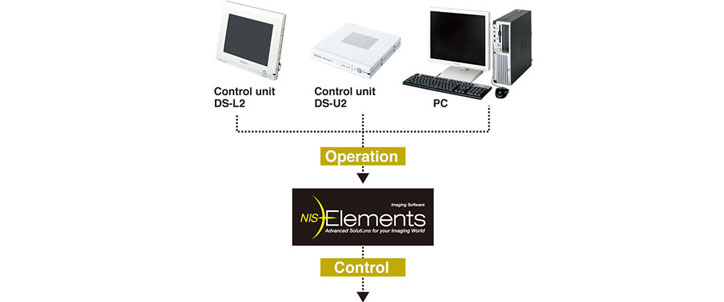
- AZ100M
-
Intelligent nosepiece capable of communicating with a PC
The AZ100M features an intelligent nosepiece (AZ-NPI intelligent triple nosepiece) that can communicate with a PC.
The intelligent nosepiece transmits information on objective magnification to a PC or the DS-L2 and DS-U2 digital camera control units, so that when the user changes the objective lens while measuring a component, the device will automatically switch to the appropriate calibration information. Accurate, efficient image capture, measurement, and scale display are all possible.
- Intelligent nosepiece
- Motorized Z axis movement
- Motorized zoom
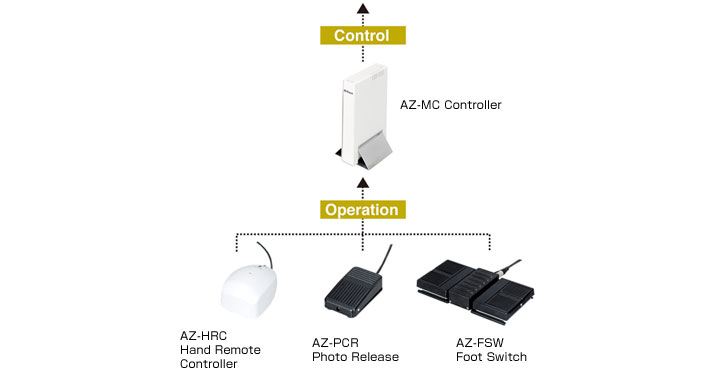
Control units for remote control of AZ100M
Zooming and focusing can be user-controlled via the AZ-MC Controller.
- The AZ-HRC Hand Remote Controller puts zoom and focusing at the user's fingertips.
- The AZ-FSW Foot Switch enables zoom and focusing via a foot control, which is especially handy when both hands are busy.
- The AZ-PCR Photo Release enables image capture via foot control in combination with AZ-FSW Foot Switch and Control Unit DS-L2.
- *Combination use of AZ-PCR Photo Release and NIS-Elements software is not possible.

Operation via Hand Remote Controller

Operation via Foot Switch/Photo Release
Microscope control window (AZ-Pad)

A: Objective lens power
B: Zoom power
C: Observation method
D: Condenser (low/high power)
E: Motorized vertical movement
F: Filter block (When combined with an AZ-FL FL unit)
Macro observation by on-axis viewing
True on-axis observation and image capture are possible in the macro region due to the AZ100M's elimination of the traditional stereoscope's angular view of the specimen.
Comparison of macro image

On-axis viewing with AZ100M

Angular viewing with a stereoscopic microscope
A wide range of magnifications
By combining built-in 8x zoom optics, which provide from 1x to 8x magnification, with a three-position objective nosepiece, the AZ100M enables observation at the highest magnification ratio of any such device in the world. The objective lens lineup consists of 0.5x, 1x, 2x, 4x, and 5x lenses. When combined with AZ-W 10x eyepiece lenses, the AZ100M covers everything from low, through medium to high magnification. In the range of 5x to 500x (the latter includes the 1.25x device magnification of the coaxial illuminator).

Motorized zooming
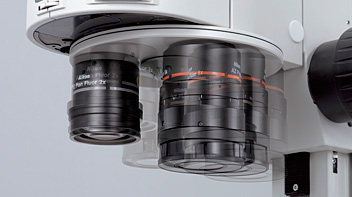
Intelligent objective changeover
Comes standard with an aperture stop
The AZ100M ships complete with an aperture stop that is effective not only for visual observation, but also for the capture of digital images. This aperture stop allows you to freely change contrast and field depth based on your specimen requirements.

Aperture stop

Superior flexibility
Tilting eyepiece tubes
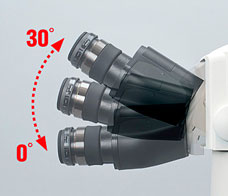
The AZ100M comes standard with eyepiece tubes that tilt from 0° to 30°. This feature enables the optimal eye level for the observer's height and posture as well as the sample height. Two different beam-split ratios for the binocular and photo port can be selected: 100:0/0:100, which is suitable for photo documentation; or 100:0/20:80, which enables visual observation while displaying an image on a monitor.
Dedicated Stand

The dual-purpose reflected/transmitted illumination stand enables stable, blur-free observation. The three-plate structure of the stage enables stable operation even for observation at high magnification, providing superior durability even when supporting heavy samples
Double-coarse/fine focusing system

- *Differs depending on the objectives combination.
The AZ100M stand combines motorized focus (stroke: 85mm) on the column side, and a comfortably operated manual focus conveniently located on the front stage side (stroke: 10mm), enabling observation of samples with a height up to a maximum of 85.5mm.
Various microscopy methods
In addition to brightfield observation, a wide range of observation methods is possible, including epi-fluorescence, Nomarski DIC, simple polarizing and oblique illumination. AZ100M enables simultaneous mounting of epi-fluorescence and diascopic DIC attachments, allowing effortless switching between observation modes.
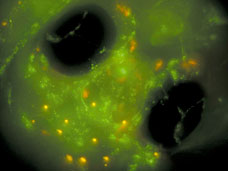
Epi-fluorescence

Episcopic DIC
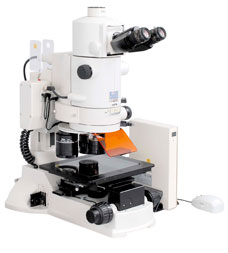
combination with epi-fluorenscence and diascopic DIC attachments
